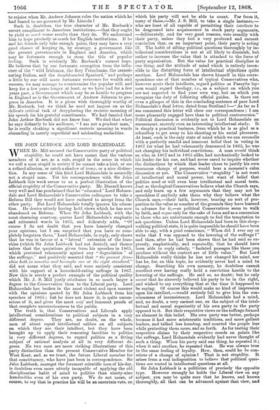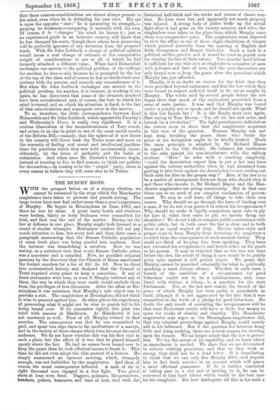SIR JOHN LUBBOCK AND LORD HOLMESDALE.
WHEN Mr. Mill accused the Conservative party of political stupidity, he could not have meant that the various members of it are, as a rule, stupid in the sense in which we call a man stupid in society if he cannot take a hint, or see a refined allusion, or catch a shadow of irony, or a nice distinc- tion. In any sense of this kind Lord Holmesdale is assuredly not a stupid man. Yet his correspondence with Sir John Lubbock this week seems to us a perfect illustration of the official stupidity of the Conservative party. Mr. Disraeli knows very well and has proclaimed that he "educated" Lord Holmes- dale and Lord Holmesdale's Conservative colleagues to take a Reform Bill they would not have endured to accept from the other party. But Lord Holmesdale totally ignores his educa- tion. He denies utterly having held views which he has now abandoned on Reform. When Sir John Lubbock, with the most charming courtesy, quotes Lord Holmesdale's emphatic and reiterated words in 1865, and delicately adds, "Of course I do not doubt that you have honestly changed your opinions, but I am surprised that you have so com- pletely forgotten them," Lord Holmesdale, in reply, only shows that he was in favour of a " lateral " extension of the fran- chise (which Sir John Lubbock had not denied), and thence infers that the quotations given from his speeches in 1865, which protested vehemently against any " degradation " of the suffrage," and positively asserted that " the present fran- chise both.in counties and boroughs are at the right standard," did not mean what they said, and were entirely consistent with his support of a household-rating suffrage in 1867. Now this is surely a perfect example of the political quality which Mr. J. S. Mill justly attributes in so much larger a degree to the Conservative than to the Liberal party. Lord Holmesdale has broken in the most violent and open manner with the opinions quoted by Sir John Lubbock from his speeches of 1865 ; but he does not know it, is quite uncon- scious of it, and gives the most nqf and innocent proofs of that complete unconsciousness to the public.
The truth is, that Conservatives and Liberals apply intellectual considerations to political subjects in a very different degree. They are, no doubt, on the whole, men of about equal intellectual calibre on all subjects on which they use their intellect, but they have been brought up to apply their reasoning faculties to politics in very different degrees, to regard politics as a fitting subject of rational analysis at all in very different de- grees. No two men are more striking illustrations of this party distinction than the present Conservative Member for West Kent, and, as we trust, the future Liberal member for that constituency, who have just been in correspondence. Sir John Lubbock, amongst the foremost scientific men of his day, is doubtless even more utterly incapable of applying the old disciplinarian habit of mind to politics than ninety-nine hundredths even of his own party. We do not mean, of course, to say that in practice his will be an uncertain vote, on which his party will not be able to count. Far from it, many of those,—Mr. J. S. Mill, to take a single instance,— who are least of all capable of permitting their intellects to be dragooned into acquiescence in stock party arguments,. —deliberately, and for very good reasons, vote steadily with their party, unless they feel a very profound and earnest conviction that, on an important point, their party is acting ill. The habit of sifting political questions thoroughly by in- tellectual considerations is not at all likely to diminish, but rather to increase the value that is attached to the force of party organization. But the value for practical discipline is one thing, and the attitude of mind which is entirely insen- sible to the disturbing force of intellectual objections quite- another. Lord Holmesdale has shown himself in this corre- spondence one of that number of typical Conservatives who, however acute their intellects, regard politics as Puseyite lay- men would regard theology, i.e., as a subject on which you are not expected to find your own way, but on which you recognize the duty of following official guides. Is there not even a glimpse of this in the concluding sentence of poor Lord Holmesdale's final letter, dated from Scotland ?—" As far as I am concerned this letter will close our correspondence ; I am more pleasantly engaged here than in political controversies." Political discussion is evidently not to Lord Holmesdale an amusement, scarcely even an interesting intellectual study. It is simply a practical business, from which he is as glad as a schoolboy to get away to his shooting or his social pleasures. At least, such is the only state of mind which we can reconcile- with a perfectly candid and innocent belief that in voting in 1867 for what he had vehemently denounced in 1865, he was. not changing his individual convictions. A man would thinlr so, who, in 1867 and in 1865 alike, had mechanically looked to his leader for his cue, and had never cared to inquire whether- the distinctions by which that leader chose to justify his own enormous change of purpose, would bear a moment's calm discussion or not. The Conservative " stupidity " is not want of intellectual and moral power, but want of belief that- politics need or will even bear intellectual and moral tests. Just as theological Conservatives believe what the Church says, and only learn up a few arguments that they may not be speechless if anybody asks them why they believe what the• Church says,—their faith, however, bearing no sort of pro- portion to the value or number of the grounds they have learned to advance for it,—so political Conservatives seem to walk by faith, and argue only for the sake of form and as a concession to those who are unfortunate enough to feel the temptation to• ask questions. Unless Lord Holmesdale had been in this sleep- walking political state, it is quite impossible he should have been able to say, with a good conscience, " When did I ever say or write that I was opposed to the lowering of the suffrage ?" and then, after he had been shown that he had said so ex- pressly, emphatically, and repeatedly, that he should have- been able to reply calmly, " Isolated passages like these you produce without the context are of little value." But Lord. Holmesdale really thinks he has not changed his mind, nor has he, for, on this topic, he evidently never had a mind to change. Searching his own memory, he doubtless cannot recollect ever having really held a conviction hostile to the• lowering of the suffrage. He said so, no doubt; but he only meant that he sincerely believed his party to be in the right, and wished to say everything that at the time it happened to be saying. Of course this would make no kind of impression upon his intellect, —would entirely fail to give him the con- sciousness of inconsistency. Lord Holmesdale had a mind, and, no doubt, a very earnest one, on the subject of the intel- lectual and moral superiority of his own party to the party opposed to it. But their respective views on the suffrage formed no element in this belief. His own party was better, perhaps- because it had more aristocratic traditions, and more gallant leaders, and talked less humbug, and courted the people less. while protecting them more, and so forth. As for testing their respective claims by their respective creeds on points like the suffrage, Lord Holmesdale evidently had never thought of such a thing. When his party said one thing, he repeated it ; when it said another, he repeated that. He was always true- to the same feeling of loyalty. How, then, could he be con- scious of a change of opinion ? That is not stupidity. It arises from a real indisposition to believe that political ques- tions are rooted in intellectual questions at all.
Sir John Lubbock is a politician of precisely the opposite type. However strongly he holds the Liberal view on any subject, you may be quite sure that he knows, and knows thoroughly, all that can be advanced against that view, and that these counter-considerations are almost always present to his mind, even when he is defending his own view. His eye is upon the opposite " case ;" he is measuring its strength,— gauging its weakness,—comparing it mentally with his own. Of course, if he " changes" his mind, he knows it ; just as an experienced guide in an intricate country will know that he has changed his route, though those whom he is pioneering will be perfectly ignorant of any deviation from the proposed track. With Sir John Lubbock, a change of political opinion would mean a real change of estimate of the comparative weight of considerations to one or all of which he had formerly attached a different value. When Lord Holmesdale exchanges one answer to the political problem of the suffrage for another, he does so only because he is prompted by the boy at the top of the class, and of course he has no intellectual asso- ciations with the process, and scarcely any remembrance of it. But when Sir John Lubbock exchanges one answer to the political problem for another, it is because, in working it out again, he has discovered that some of the elements involved have been miscalculated, and, of course, the fact to which his mind is turned, and on which his attention is fixed, is the fact of that miscalculation and consequent error in the answer.
To us, therefore, the little correspondence between Lord Holmesdale and Sir John Lubbock, which appearedin Tuesday's and Wednesday's Times, is really very significant. It is a curious illustration of the inconsiderateness of Tory creeds, and seems to us also to point to one of the most useful results of the Reform Bill,—namely, that the upheaval of new forces in the country will throw back the Tories more and more on the necessity of finding real moral and intellectual justifica- tions for positions which they now hold mechanically, incon- siderately, by the force of authority and the habit of submission. And when once Mr. Disraeli's followers begin, instead of trusting to Mm to find reasons, to think out politics for themselves,—in ceasing to be the " stupid " party, there is every reason to believe they will cease also to be Tories.































 Previous page
Previous page